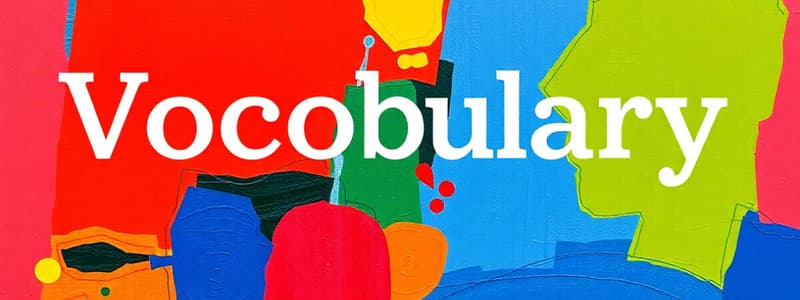Podcast
Questions and Answers
In the context of vocabulary building, what is the primary benefit of understanding word etymology?
In the context of vocabulary building, what is the primary benefit of understanding word etymology?
- It provides insights into the historical usage of words, which is essential for academic writing.
- It simplifies the process of using a dictionary by providing direct definitions.
- It aids in understanding the structure and meaning of words, making it easier to infer meanings. (correct)
- It helps in memorizing words quickly through rote learning.
Collocations refer exclusively to vocabulary related to academic fields and are not commonly found in everyday language.
Collocations refer exclusively to vocabulary related to academic fields and are not commonly found in everyday language.
False (B)
In what way does understanding the connotations of words enhance communication skills?
In what way does understanding the connotations of words enhance communication skills?
allows precise and appropriate word choice
Using new words in essays and reports, while avoiding _________ and _________, enhances writing.
Using new words in essays and reports, while avoiding _________ and _________, enhances writing.
Match the vocabulary learning technique with its description:
Match the vocabulary learning technique with its description:
What is the significance of understanding 'register' in vocabulary?
What is the significance of understanding 'register' in vocabulary?
Denotation refers to the emotional associations or secondary meanings of a word, rather than its literal definition.
Denotation refers to the emotional associations or secondary meanings of a word, rather than its literal definition.
What role does 'peer feedback' play in the review and practice stage of vocabulary acquisition?
What role does 'peer feedback' play in the review and practice stage of vocabulary acquisition?
To retain vocabulary in the long term, utilizing _________ and establishing _________ are essential.
To retain vocabulary in the long term, utilizing _________ and establishing _________ are essential.
Which of the following is the MOST effective way to infer the meaning of an unfamiliar word while reading?
Which of the following is the MOST effective way to infer the meaning of an unfamiliar word while reading?
Using jargon and technical terms is appropriate in all types of communication, irrespective of the audience.
Using jargon and technical terms is appropriate in all types of communication, irrespective of the audience.
In what ways might figurative language enhance communication?
In what ways might figurative language enhance communication?
The final assessment includes a _________ and an _________ component.
The final assessment includes a _________ and an _________ component.
Why is it important to avoid over-reliance on clichés in writing?
Why is it important to avoid over-reliance on clichés in writing?
Continuous learning and expansion of vocabulary should cease upon completion of a formal vocabulary course.
Continuous learning and expansion of vocabulary should cease upon completion of a formal vocabulary course.
Flashcards
Etymology
Etymology
The art and science of word origins, tracing how words have evolved over time.
Suffix
Suffix
A part added to the end of a word that changes its meaning or function.
Prefix
Prefix
A part added to the beginning of a word that changes its meaning or function.
Synonyms
Synonyms
Signup and view all the flashcards
Antonyms
Antonyms
Signup and view all the flashcards
Word Connotation
Word Connotation
Signup and view all the flashcards
Word Denotation
Word Denotation
Signup and view all the flashcards
Idiom
Idiom
Signup and view all the flashcards
Domain-Specific Vocabulary
Domain-Specific Vocabulary
Signup and view all the flashcards
Analogy
Analogy
Signup and view all the flashcards
Metaphor
Metaphor
Signup and view all the flashcards
Simile
Simile
Signup and view all the flashcards
Register
Register
Signup and view all the flashcards
Collocations
Collocations
Signup and view all the flashcards
Phrasal Verb
Phrasal Verb
Signup and view all the flashcards
Study Notes
- The course aims to help learners master their vocabulary in 40 hours.
- Learners will expand their vocabulary by learning and retaining over 500 new words.
- Synonyms, antonyms, idioms, and domain-specific terms will be covered.
- Learners will improve their vocabulary usage in speaking and writing in various contexts.
- The course will enhance comprehension skills to infer meanings of unfamiliar words from context.
- Learners will gain confidence in using advanced vocabulary in academic, professional, and social settings.
- The course will develop long-term retention strategies to retain and expand vocabulary over time.
Course Syllabus
Module 1: Foundations of Vocabulary (5 hours)
- This module covers the importance of vocabulary in communication and setting personal vocabulary goals.
- It provides an overview of word families including roots, prefixes, and suffixes.
- The module covers common Latin and Greek roots.
- Etymology helps in understanding word meanings.
- Effective use of dictionaries and thesauruses is covered.
- Instruction about understanding word forms (noun, verb, adjective, adverb) is also provided.
Module 2: Building a Strong Vocabulary (10 hours)
- The module addresses memorization techniques, like mnemonics, flashcards, and spaced repetition.
- Contextual learning involves reading and identifying new words.
- Focus is given to expanding vocabulary through synonyms.
- Learners will understand the nuances between similar words.
- Learners will explore thematic vocabulary (e.g., business, technology, emotions).
- Collocations and common word pairs are covered.
- Common idiomatic expressions will be taught.
- Instruction regarding phrasal verbs and their meanings will be provided.
Module 3: Advanced Vocabulary (10 hours)
- Understanding register and tone is covered.
- Using advanced vocabulary in academic and professional settings will be addressed.
- Focus will be given to positive, negative, and neutral connotations.
- Learners will be taught to choose the right word for the right context.
- Vocabulary for specific fields (e.g., medicine, law, IT) will be covered.
- Learners will become familiar with jargon and technical terms.
- Metaphors, similes, and analogies will be investigated.
- Figurative language enhances communication.
Module 4: Practical Application (10 hours)
- Using new words in essays, emails, and reports is covered.
- Learners will be taught how to avoid redundancy and clichés.
- Learners will practice new words in conversations and presentations.
- Vocabulary usage improves fluency and confidence.
- Meanings are inferred from context.
- Analyzing advanced texts (articles, literature, etc.) is discussed.
- New words can be learned through podcasts, videos, and speeches.
- Note-taking and summarizing will be practiced.
Module 5: Retention and Expansion (5 hours)
- Quizzes, games, and interactive activities will be implemented.
- Group discussions and peer feedback help retention.
- Spaced repetition systems (e.g., Anki) are useful for retention.
- Daily habits for continuous learning are addressed.
- Creating a personalized vocabulary plan for the future will be undertaken.
- Resources for ongoing learning like apps, books, and online tools will be reviewed.
Learning Outcomes
- Learners will be able to recognize and use over 500 new words.
- They will confidently use new vocabulary in speaking and writing.
- Learners will understand word origins.
- Breaking down words using roots, prefixes, and suffixes helps to infer meanings.
- Learners will differentiate between similar words.
- They will use synonyms and antonyms effectively, understanding subtle differences.
- Vocabulary will be applied in context.
- Domain-specific and advanced vocabulary will be used appropriately in academic, professional, and social settings.
- Learners will infer meanings from context.
- They will guess the meanings of unfamiliar words while reading or listening.
- Vocabulary will be retained long-term with strategies like spaced repetition and daily practice.
Assessment and Certification
- Weekly quizzes track progress and reinforce learning.
- The final assessment includes a written test (fill-in-the-blanks, synonyms/antonyms, essay writing).
- The final assessment includes an oral component (presentation or conversation).
- A certificate of completion is awarded to participants who achieve 80% or higher in the final assessment.
Additional Resources
- Word Power Made Easy by Norman Lewis is a recommended book.
- The Vocabulary Builder Workbook by Chris Lele is a recommended book.
- Quizlet, Memrise, Anki, and Merriam-Webster Dictionary are useful apps.
- Vocabulary.com, Thesaurus.com, and Merriam-Webster Word of the Day are useful online tools.
Studying That Suits You
Use AI to generate personalized quizzes and flashcards to suit your learning preferences.



